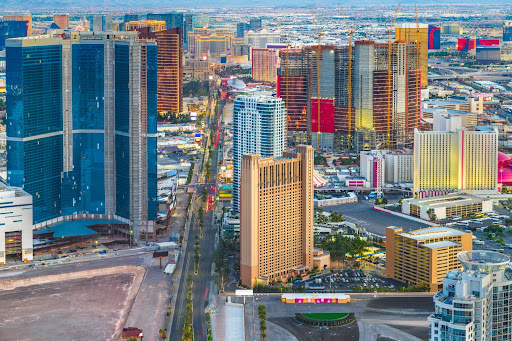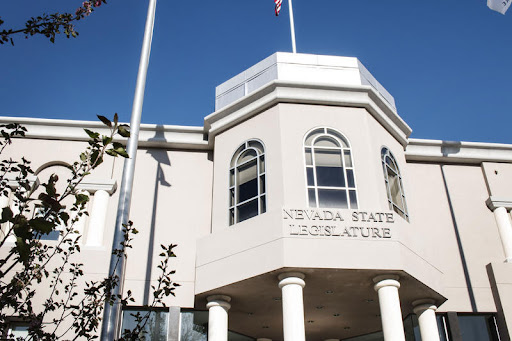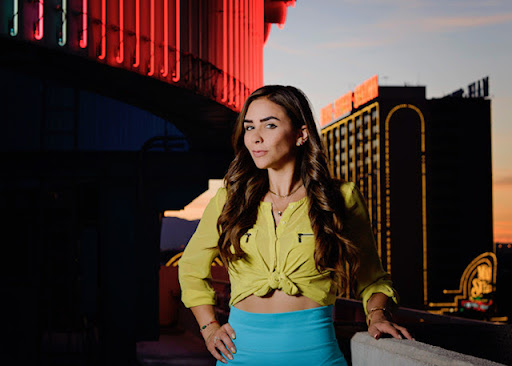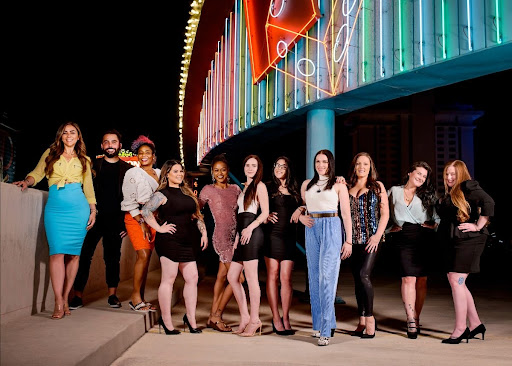
When it comes to hospitality, gaming, and nightlife, nobody does it quite like Las Vegas. Now, the city has a chance to set the bar for cannabis entertainment.
In June 2021, Gov. Steve Sisolak signed a bill that would legalize cannabis consumption lounges. The initiative, which goes into effect on October 1, will allow existing dispensaries to add a space for a lounge and allow independent businesses to build a consumption lounge with single-use cannabis products.
While it may seem like Sin City would be among the first to pass this, there’s already a handful of states where consumption lounges are legal. The most significant difference between this initiative and other states is that the sky is the limit.
“Even though the bill says ‘consumption lounge,’ it can be any venue. It can be a hotel, roller rink, spa, or barbershop,” said Tina Ulman, President of the Chamber of Cannabis, a non-profit dedicated to helping progress the cannabis industry. “Think of any successful business now and add cannabis to it. And then, you can infuse food and non-alcoholic drinks.”
For Ulman and many professionals and enthusiasts alike, this bill has been a long time coming. While recreational adult use has been legal for four years, there isn’t any public place where tourists and locals can partake in it. For the past two years, Ulman and other cannabis advocates have been working to reform this policy, and it’s been a tumultuous, long-winded ride.
Missing Details in Question 2
Question 2, a ballot question to legalize recreational marijuana, passed in Nevada in November 2016. And while it was a major win for cannabis, not all the details were fully fleshed out. For example, the bill did not specify whether it was legal to discriminate against someone if they were a cannabis smoker or if it was legal for parents to smoke around children. Even more so, it stated nothing about tourists, who make up roughly 32 percent of Las Vegas’s gross economic output, and how they could consume.
Under Nevada’s current law, consuming cannabis is prohibited everywhere except your private residence. This means that for renters, travelers, and those looking for a safe place to smoke outside of their house, there aren’t any options. Despite hosting some of the world’s largest cannabis retail stores, there is no place to light up legally.
“All of these things weren’t really thought through. I don’t know what happened,” said Ulman. “But nevertheless, all of these baby steps continue to get us better with cannabis laws and reforming the ones that are still antiquated.”
While it is illegal for tourists to smoke inside their hotel rooms, nightclubs, or inside casinos, it’s common knowledge that this is still happening. Though a cannabis consumption lounge technically already exists (because it sits on Paiute Tribe land), there is an evident need for state-licensed and regulated locations where tourists and locals can smoke legally.
Presenting to Policymakers
The proposal for cannabis consumption lounges was first presented to Nevada policymakers in 2017. At the time, then-governor Brian Sandoval shot down the attempt citing it could “spark the ire of the federal government.”
The second debacle came after Las Vegas city officials approved an ordinance in 2019, which was then overridden by Assembly Bill 533. This delayed the opening of any legal cannabis venues until at least July 2021. Unfortunately, many dispensaries had already started to build and prepare for the lounges before the ordinance was overturned.
Some believe this decision came from the influence of wealthy casino owners to help slow down the regulatory approval process. Although consumption lounges would likely create an increase in tourism and tax revenue, it’s believed that casino owners fear it will cause some travelers and locals to spend less time in their establishments.
Despite this, Sisolak’s office said the decision was to address unspecific issues as a result of rushed cannabis policies made under former Gov. Brian Sandoval. In response, he also created the Cannabis Compliance Board (CCB), which would investigate these problems.
Pictured: Tina Ulman, President of Chamber of Cannabis
Chamber of Cannabis
After two long years of waiting, the idea of cannabis consumption lounges was ready to be proposed to state legislatures again. This time, a trailblazing group led by women was the spearhead of it, the Chamber of Cannabis.
Established in October 2020, the non-profit came into fruition as a way to unite cannabis professionals, strengthen commerce, and help progress the industry. Since its inauguration, the organization has been a major player in cannabis policy reform, including drafting Assembly Bill 341.
Tina Ulman, President of the Chamber of Cannabis, first met the assemblyman who would introduce the bill three years prior to its passing.
“He had said if we present a proposal for the consumption lounges and [he] likes it, he would sponsor the bill,” said Ulman. “So that’s exactly what we did. We were the only organization and business in the state to present it. He opened it up to many people. So truly, without the Chamber of Cannabis efforts, this would have not happened.”
Defining Social Equity
AB341 is a first across multiple areas. Along with permitting cannabis lounges, it’s also the first bill to establish social equity. The initiative explicitly prioritizes inclusion by requiring at least 10 of the first 20 independent lounge licenses to be issued to social equity applicants.
Ulman, who also serves on the CCB’s Social Equity, Diversity, and Inclusion Committee, is helping determine these variables and what it means for people.
“It’s for those folks that have been adversely affected by cannabis policy and drug policy in general,” she said. “25 percent of the licenses are going to social equity and development applicants. Right now that number is 10. But as more dispensaries open with these lounges, then they also have to open more independent lounges. So it’s actually an even ratio.”
Currently, there is an expensive barrier to entry for opening a dispensary in Nevada. To start, there is a $5,000 initial application fee (non-refundable if denied) and a $30,000 initial licensure fee. An applicant must also show proof of a property that complies with state law on marijuana establishments. Typically, this requires remodeling to fit the law’s specific security requirements.
Most notably, however, is the $250,000 liquid asset requirement. If an applicant lacks sufficient capital, they will be denied. This pricey requirement has kept many from entering the industry, leaving it skewed to those with disposable wealth.
One report released by the CCB in February found that although the cannabis industry workforce is mostly people of color, the majority of business owners and board members are disproportionately white and male.
To help address this, the Chamber of Cannabis prioritized reducing the application costs and adjusting the requirements. Under AB341, social equity applications will cost $2500. Additionally, there will not be a $250,000 liquid asset requirement, though the specific metrics have not been established yet. Ulman noted that this will also help disperse the licenses to more individuals, rather than large groups.
“Assemblyman Steve Yaeger said it best, ‘Those who got more on dispensary licenses aren’t getting more again,’” said Ulman. “That’s really important when it comes to who gets to play in this field.”
Along with this, the CCB will also finalize other details of the bill. For example, they will specify what cannabis products can be consumed at the lounges and in what quantities.
What we do know now is that alcohol will not be permitted. Additionally, lounges won’t be allowed to be within 1,000 feet of a school, 300 feet of any “community facility” or 1,500 feet of a business with a nonrestricted gaming license.
Compromising for Policy
Though the initiative includes many wins, not all pieces were included. Ulman notes that the Chamber of Cannabis had to make some compromises on their original bill for it to pass. However, she did note, “that’s what makes great policy.”
According to Ulman, “What’s missing is the opportunity for lounges to purchase their cannabis from a cultivator, producer, or dispensary. A free market, if you will. Just like a restaurant can order from a grocery store, distributor, or a small farmers market, that is how it should be.”
She said that for it to pass, the group compromised so that independents lounges are buying straight from the dispensary.
The bill states, “An independent cannabis consumption lounge shall enter into a contract with one or more adult-use cannabis retail stores to sell to the independent cannabis consumption lounge.”
This means lounges will be getting their supply from dispensaries if one is not already attached. Because outside products will be prohibited in cannabis lounges, it is unclear how this will affect prices inside these establishments. However, due to the competitive nature of the cannabis industry, we can assume that prices will reflect similarly to retail dispensaries.
“We just want to make sure consumers are getting fair prices,” she said. “We want to make sure there’s no price gouging, that prices can compete, so people actually visit the consumption venues.”
Entering a New Era
AB341 will go into effect on October 1, and the first cannabis consumption lounges are expected to open in early 2022. While many may think lounge and assume a room filled with couches, the bill leaves space for much more creativity. License holders are free to open cannabis-friendly bakeries, wellness centers, or anything the entrepreneur imagines.
“I already had some talks with some of the most popular chefs in Las Vegas – Cirque du Soleil even,” said Ulman. “This is so much bigger than our little cannabis world.”
The introduction of cannabis to Las Vegas added a new allure for the millions of tourists that visit the city each year. Along with the world-renowned entertainment, coveted restaurants, and fast-paced nightlife, tourists will now be able to enjoy another facet that the city has to offer: cannabis consumption lounges.
In the future, Ulman sees a huge opportunity to grow the Arts District area. But even more so, she sees the new law as a way to grow Las Vegas’ legacy.
“Ultimately, we want this to be the most thriving and inclusive state in the U.S.”
To learn more about the Chamber of Cannabis or get involved, visit their website or follow them on Instagram. For all additional questions, please feel free to contact us. You can also check out our menu online for flower, edibles, concentrates, and more.



